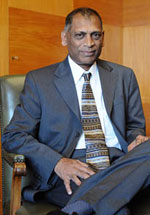 |
| Dr. Leslie Ramsammy. |
"Health and development must be seen as one and the same thing,” says Leslie Ramsammy, president of the World Health Organization’s 61st World Health Assembly. “Without health there is no development; they are inextricably linked.”
In an impassioned and poignant lecture Thursday night in the Scotiabank Auditorium, Dr. Ramsammy insisted the global community embark on a quest for social justice through health equity for all countries. Dr. Ramsammy, Guyana’s Minister of Health since 2001, has focused his activism under the slogan, “Health for All.”
In a global health environment where over 80 per cent of childhood and maternity deaths are from preventable causes, it is unacceptable that there is so much inequity in the global healthcare system. It is “unfair,” he says, that people get to live longer in some countries, but others, because they were not so lucky to be born in a developed country, do not. Although there has been an impressive reduction in the number of annual child deaths over the past 30 years, approximately 9.7 million children still die every year. By sharing global resources and participating in a “real revolution on the path to social justice,” Dr. Ramsammy believes that by 2025 no country in the world will have a life expectancy lower than 60 and nowhere in the Americas will the life expectancy be below 70.
'Reasonable actions'
To achieve those goals, there will have to be greater inter-governmental cooperation, a break down of economic trade barriers, more incentive for healthcare professionals to practice in their home country, and a cessation of time-consuming studies that prevent medicine from getting to the people who need it as soon as possible. These are all “reasonable actions to take to prevent inequities,” says Dr. Ramsammy. “We have the promise of living under mercy and justice, not supply and demand.”
We have the capacity to provide resource-poor settings with the necessary medical care and supplies, says Dr. Ramsammy, but the “caveat is that we don’t have the will to make it happen, to prevent preventable deaths.” If less than $1 a day can provide a vaccine for rotavirus, the leading cause of child mortality in Africa, it is inexcusable that a single child should die due to preventable causes, he says.
Global fraternity
“Why not?” he asks. “(Why can we not) have the elimination of all preventable deaths?”
It is a commitment that will not cause us much problem, he says. “It is possible with the resources we have now, the tools we have now, the knowledge we have now.” The quest for social justice is our quest for social justice. Without passion over health inequity and learning to distribute resources in a communal manner we betray our sense of global fraternity.
Evoking the words of Barack Obama, one of our most inspirational proponents of change, Dr. Leslie Ramsammy, proclaims that we do not need the audacity to hope, for “if we need audacity to hope, we are dead.” Instead, we need the “audacity to demand.”
